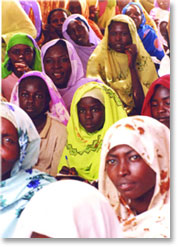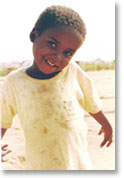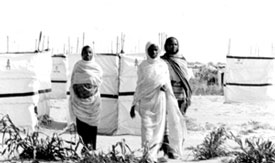
Nine things that we did not know
1. KHARTOUM, Sudan (FinalCall.com) – The Arab/African identity is the term constructed around the language the people speak–not their race. All of them speak Arabic, so they all considered themselves Arabs. However, to further distinguish those tribes who retain their local and Arabic language, those tribes are called African. The conflict is not ethnic–they are one people.
2. The recent conflict was instigated by a rebel movement that began attacking police and government officials in Darfur around the same time that the ceasefire was being signed to end the civil war between the north and the south. In one of the earlier clashes, the rebels attacked Elfasher Airport, killing 75 policemen and taking an air commander hostage with them.
3. The Darfur region is abundantly rich in natural resources such as gold, iron and copper. Also, the region is an immense source of oil and underground water that has yet to be tapped for usage.
4. The recent fighting is rooted in historical clashes between tribes that have been going on for the past 400 years between nomads and farmers who compete for water and land resources. This is not a new conflict.

5. The so-called “janjaweed,” to which news reports refer, are a renegade element of the Popular Defense Force (PDF). The PDF, which is comprised of both Arab and African tribes, is a long-standing program where the government recruits local tribal members who assist the military in resolving conflicts–a common practice in many other countries. The PDF has taken advantage of the chaos, seeking self-interest in attacking civilians in order to gain property.
6. ALL OF THE TRIBES FIGHTING IN THE DARFUR REGION ARE MUSLIMS, WHICH DISPELS THE NOTION PUT FORTH BY WESTERN MEDIA THAT THE CONFLICT IS DRIVEN BY ISLAMIC AGGRESSION. THERE ARE NO RELIGIOUS UNDERTONES IN THIS FIGHTING. IT IS A FIGHT OVER THE ABUNDANT RESOURCES WITHIN THE REGION.
7. The word janjaweed is a new term, not found in a dictionary, which is generally applied to outlaws traveling on horseback to rob and attack people. It is not the formal name of an isolated Arab militia newly formed by the government to specifically kill Black Africans.

8. The United States of America has had sanctions on The Sudan since the early 1990s, restricting U.S. firms from doing business and trading with the country.
9. Many news reports in Western media do not show pictures of Sudanese leadership. Because the president and vice president look like Black people in America, their images would contradict the media’s emphasis that the Khartoum government is led by light-skinned Arabs who are against Black people. This media black-hole conjures up images of Arab shop-keepers in Black communities who often resemble White-looking Arabs.
Nine things that we were told
1. When news reports condemned the Khartoum government for refusing humanitarian aid, we were told by a Sudanese official that they in fact had rejected Genetically Modified (GM) food because of its potential harmful effects on future agriculture. The humanitarian aid groups told the government that the GM food was safe, but would not produce a certificate confirming its safety. However, after overwhelming pressure, the Sudanese government gave in and accepted the GM food.
2. Although news reports highlight the janjaweed riding on horseback reeking havoc, they fail to note that the rebels are driving humvees and are fighting the military using weaponry much more sophisticated than those used by the military, one Sudanese military official told us.
3. The central government in Khartoum, the capital of The Sudan, is diverse, made up of both African and Arab tribes on all levels of national, regional and local leadership. Local leaders in Darfur told us that there are inequalities and feel that the central government does not give enough attention to the problems of development within the Darfur region.
4. Instead of picking up guns to fight the central government, these local leaders (which we met with) have formed a political lobby to press the central government for greater equalities. They positively believe that the rebels and janjaweed cannot be disarmed without their help.
5. One Sudanese government official told us that the administration rejects peacekeeping troops because he said “This is an African problem that should be and can be solved by Africans.” They acknowledge that they need help with communication and transportation supplies and materials, and welcome the help of the African Union to mediate, but they will not compromise the sovereignty of their country to Western and Zionist interests.
6. Although the Khartoum government sustained criticisms for the difficulties international groups had entering with humanitarian aid, part of the problem is the defunct railway system due to the lack of spare parts needed to fix it. These parts cannot be brought into the country for they are manufactured by the Unites States-based company General Motors, and current sanctions prohibit such transactions. While the Sudanese government suspended their customs, immigration, road weights and port laws to give these humanitarian aid groups 100 percent access, the United States government has not been willing to lift existing sanctions which would facilitate their travel in the country. The lifting of the sanctions will bring much needed spare parts to fix the railway system–they are now relying on goods being transported by airplane and limited roads.
7. The Sudanese government refused claims that 50,000 people had been killed in the Darfur conflict and maintain that approximately 5,000 people have been killed.
8. The Sudanese government estimates about 1 million people out of the 6 million that live in Darfur are internally displaced as a result of the conflict–not the 1.5 million reported by international groups. They also said that there are no more than 150,000 refugees in Chad–not the 250,000 to 300,000 being reported. The Sudan is the largest country on the African continent and Darfur is the size of France.
9. Even though the government has been charged with not working to resettle the displaced people back in their villages, a government official told us that during a meeting with several international aid groups, they were told that they do not have the funds to give the Sudanese government to implement the resettlement plan. What the donors have given them thus far has only been able to take care of 20 percent of the needs of the displace people–food, shelter, clothing and medicine.
The Sudan needs help, not sanctions!
(In next week’s edition of The Final Call, look for my Sudanese diary; a look at the legal question of genocide; a history of African governments that the U.S. covertly destabilized; and a special photo essay of the women and children in refugee camps we visited.)












